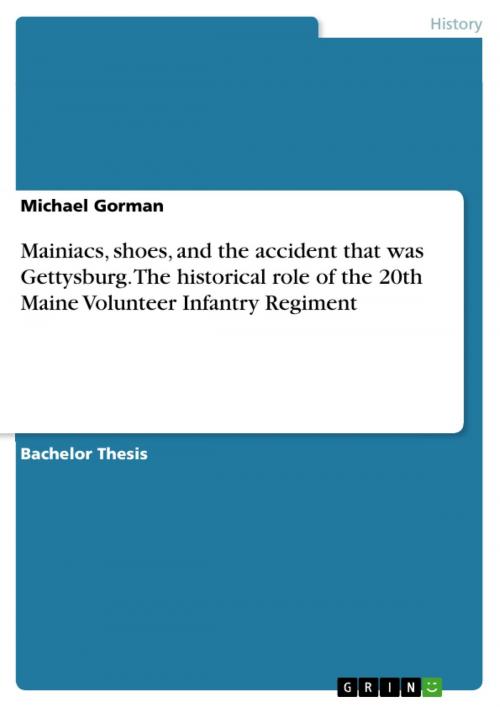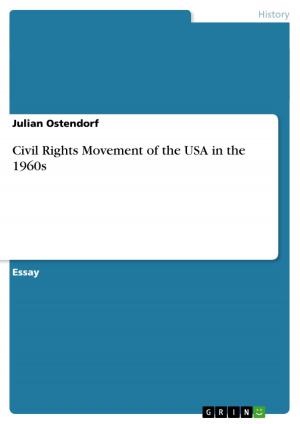Mainiacs, shoes, and the accident that was Gettysburg. The historical role of the 20th Maine Volunteer Infantry Regiment
Nonfiction, History, Americas, United States| Author: | Michael Gorman | ISBN: | 9783668237346 |
| Publisher: | GRIN Publishing | Publication: | June 8, 2016 |
| Imprint: | GRIN Publishing | Language: | English |
| Author: | Michael Gorman |
| ISBN: | 9783668237346 |
| Publisher: | GRIN Publishing |
| Publication: | June 8, 2016 |
| Imprint: | GRIN Publishing |
| Language: | English |
Bachelor Thesis from the year 2014 in the subject History - America, grade: 100.0, Westminster College, course: Thesis Class, language: English, abstract: The Battle of Gettysburg is one of the most well-known battles of the American Civil War and in American military history. It was widely believed that this battle ultimately set the course of the war's outcome, turning the tide in favor for the Union Army. The 20th Maine Volunteer Infantry Regiment, a unit largely comprised of Maine's undesirable, leftover volunteers, was resupplied by the soon-to-be-court-martialed mutineers of the 2nd Maine Volunteer Infantry. It was posted at the far left of the Union army's defensive line, atop Little Round Top on the 2nd of July, 1863, the second day of the battle. Aside from shedding light on the strategic importance of the 20th Maine's defensive position, at Little Round Top, for the Battle, and more importantly-the war in whole, this thesis will also take a deeper look into the enlisted men of 20th Maine, their commanding officers, and the mutineers of the 2nd Maine who were sent to reinforce them before the battle. It will examine the claim that Colonel Joshua Chamberlain was not the one who ordered the 20th Maine to make their famous bayonet charge into enemy line, but rather his subordinate officer.
Bachelor Thesis from the year 2014 in the subject History - America, grade: 100.0, Westminster College, course: Thesis Class, language: English, abstract: The Battle of Gettysburg is one of the most well-known battles of the American Civil War and in American military history. It was widely believed that this battle ultimately set the course of the war's outcome, turning the tide in favor for the Union Army. The 20th Maine Volunteer Infantry Regiment, a unit largely comprised of Maine's undesirable, leftover volunteers, was resupplied by the soon-to-be-court-martialed mutineers of the 2nd Maine Volunteer Infantry. It was posted at the far left of the Union army's defensive line, atop Little Round Top on the 2nd of July, 1863, the second day of the battle. Aside from shedding light on the strategic importance of the 20th Maine's defensive position, at Little Round Top, for the Battle, and more importantly-the war in whole, this thesis will also take a deeper look into the enlisted men of 20th Maine, their commanding officers, and the mutineers of the 2nd Maine who were sent to reinforce them before the battle. It will examine the claim that Colonel Joshua Chamberlain was not the one who ordered the 20th Maine to make their famous bayonet charge into enemy line, but rather his subordinate officer.















